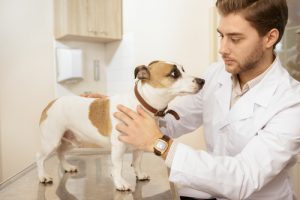 By Allison Sande, DVM, DACVIM (Small Animal Internal Medicine), DACVECC
By Allison Sande, DVM, DACVIM (Small Animal Internal Medicine), DACVECC
You should never feel hesitant or embarrassed to call a veterinarian if you are concerned about the health of your pet. Veterinarians and their staff are trained to handle emergencies and provide guidance. By asking some basic questions about your pet over the phone, the hospital staff member will be able to tell you if you should bring your pet to the hospital immediately for evaluation or if it is safe to wait for a scheduled examination with your veterinarian.
If you notice any of the following signs your pet may need immediate attention. In these situations, please contact or visit your local veterinary emergency hospital right away.
If you notice any of the signs above, or if you suspect a different serious problem, contact a veterinary professional directly; do not leave a voicemail or use email. If you are unable to reach someone, then bring your dog to your nearest emergency hospital.
It is important for your pet to have a primary care veterinarian, also known as a general practice veterinarian. This doctor provides ongoing preventative care to keep your pet healthy and is available to diagnose and treat many illnesses and injuries during regular business hours. If advanced or emergent care is ever needed, your primary care veterinarian will refer you to the appropriate veterinary specialist, such as those here at Red Bank Veterinary Hospital (RBVH). However, if your veterinarian’s office is closed, or if your pet’s illness or injury is severe, you should immediately proceed to an emergency hospital.
Emergency hospitals have trained veterinarians and technicians, as well as equipment available to provide care for urgent and potentially life-threatening injuries and illnesses when your family veterinarian is unavailable. Some emergency hospitals are only open evenings and weekends, while others are open 24 hours a day, 7 days per week. RBVH is open 24 hours a day, 365 days a year (including all holidays). At RBVH, your pet has access to specialists in emergency and critical care, anesthesiology and pain management, avian and exotics, cardiology, clinical nutrition, dentistry & oral surgery, dermatology and allergy, diagnostic imaging, internal medicine, interventional radiology and endoscopy, neurology and neurosurgery, oncology (medical/radiation), ophthalmology, and surgery (orthopedic/soft tissue). You can call us anytime at 732-747-3636. No appointment is ever needed for an emergency visit.
Having a pet means that, unfortunately, the unexpected may happen at any time. The best way to handle a pet emergency is to be prepared. Here are some important recommendations:
If you suspect that your pet has ingested any hazardous substances including human medications, food, home or garden products, poisonous plants, or other harmful objects, please contact the ASPCA’s 24-hour emergency poison hotline at 1-888-426-4435. A $65 consult fee may be applied. Keep this phone number in a convenient, easy to find place at home. For a comprehensive list of hazards and toxins, you may visit https://www.aspca.org/pet-care/animal-poison-control.
Once you have decided to bring your pet to the hospital for emergency treatment, be sure that you know where you are going and how to best transport your pet safely.
It is important to handle ill or injured pets carefully. Remember that they may be in distress or pain and so their behavior might be unusual or even frightening. Try your best to remain calm; this may help your pet react in a more cooperative and less aggressive manner. If you have any questions about moving your ill/injured pet, please call us.
Be sure to keep small animals, especially cats, confined to a pet carrier or enclosed container during transport in order to reduce the risk of further injury. It is just as important to confine larger dogs’ movements as well. You can use a board, sled, door, large blanket, or throw rug to serve as a stretcher if needed. Restrain your pet or carrier with a safety belt for maximum security. You may also cover your pet with a blanket as pets may go into shock, just as people do, following an injury.
If possible contact the emergency room to let them know you are bringing your pet in so that the staff can assist you when you arrive.
Red Bank Veterinary Hospital is a 24-hour Emergency and Specialty Hospital as well as a Level I Trauma Center. We are staffed with skilled and compassionate doctors 24 hours per day, 7 days per week. Please call us at (732) 747-3636 with questions or for information about our specific locations across New Jersey.